Bringing a dog into your family is a momentous decision filled with the promise of playful energy, unwavering loyalty, and boundless affection. Dogs enrich our lives, becoming cherished members of our households, offering companionship, laughter, and unconditional love – along with the inevitable dog hair. However, the key to a harmonious and joyful family-dog dynamic lies in selecting the right breed. This article delves into the essential traits that make certain dog breeds exceptionally well-suited for family life, focusing on characteristics like patience with children, a gentle nature, and trainability. We aim to guide you in finding a canine companion that will be a treasured part of your family for years to come.
Key Considerations When Choosing Family Dog Breeds
Selecting the ideal family dog goes beyond mere aesthetics. It requires a thoughtful evaluation of your family’s lifestyle, activity levels, living space, and the level of commitment you can realistically offer. Understanding your family’s dynamics is paramount to ensuring a successful match.
Before welcoming a dog into your home, honestly assess if your family is truly prepared for the responsibilities of pet ownership. It’s crucial to avoid taking on more than you can handle, as this can lead to stress for both you and the dog.
When searching for the best Family Dog Breeds, prioritize those known for their tolerant and easygoing temperaments, particularly their ability to comfortably navigate the exuberance of children. However, remember that even the most family-friendly breed requires consistent care, attention, and training to thrive.
As you embark on this exciting journey, keep these crucial factors in mind to help you choose the perfect family dog breed:
Temperament: The Cornerstone of a Family-Friendly Dog
Temperament should be your foremost consideration. A dog’s personality and how it typically reacts to different situations are critical, especially when children are involved. An ideal family dog breed will possess an even-tempered, patient nature capable of handling the sometimes unpredictable interactions with kids.
Breeds renowned as excellent family dogs, such as Retrievers and Poodles, are often characterized by their calm and gentle dispositions, making them naturally inclined to be wonderful family pets.
Size Matters: Finding the Right Fit for Your Home and Family
Size is another significant factor, especially for families with younger children or those living in smaller spaces. Small to medium-sized dog breeds are often considered the best family dogs, particularly when young children are part of the household. Their manageable size can be less intimidating for kids and easier to handle within a family environment.
Energy Levels: Matching Activity to Lifestyle
A dog’s energy level is a critical aspect that needs to align with your family’s lifestyle. Choosing a breed with energy requirements that you can realistically meet is essential for the dog’s happiness and well-being. An under-exercised, high-energy dog can become frustrated and potentially exhibit behavioral issues.
Consider your family’s activity levels. Are you an active family that enjoys outdoor adventures, or do you prefer a more relaxed pace of life? If you can provide ample exercise for a high-energy breed, then options like Border Collies or Labrador Retrievers might be suitable. However, if your family is more laid-back, mellower companions like Bichon Frises or Cavalier King Charles Spaniels might be a better fit.
Hypoallergenic Considerations: Addressing Allergies in the Family
If anyone in your family suffers from allergies, exploring hypoallergenic dog breeds is a wise step. It’s important to note that no dog breed is truly 100% hypoallergenic. However, some breeds produce less dander and shed less fur, which can significantly reduce allergic reactions.
Popular hypoallergenic dog breeds often recommended for families include Poodles, Bichon Frises, Kerry Blue Terriers, and Maltese.
If allergies are a concern, it’s advisable to arrange for the prospective pet to spend time with the allergic family member before bringing the dog home permanently. This trial period can help determine if the breed triggers any allergic reactions.
Top Dog Breeds for Families: Finding Your Perfect Match
When choosing the best dog breed for your family, prioritize breeds known for their patient temperaments and energy levels that are compatible with your family’s lifestyle. Opting for child-friendly breeds like Labrador Retrievers or Poodles, with their inherently mellow and adaptable natures, can pave the way for a harmonious and joyful home environment.
- Labrador Retriever
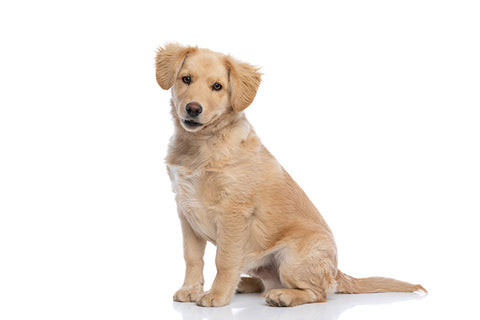 Labrador Retriever
Labrador Retriever
Labrador Retrievers effortlessly integrate into the lively dynamics of family life, embracing the hustle and bustle with enthusiasm. Their signature “ready to play fetch” expression truly encapsulates their joyful and eager-to-please nature. Labs are consistently ranked among the most popular family dog breeds worldwide, and for good reason. Their playful spirit and gentle demeanor make them ideal companions for children of all ages.
Characteristics:
- Personality: Outgoing, patient, relaxed, and eager to please.
- Energy: High energy levels, requiring daily exercise.
- Good with Children: Absolutely! Their patience with children is legendary, making them incredibly tolerant playmates. However, as with all dog breeds, supervision is always recommended, especially with very young children.
- Good with Other Dogs: Generally yes, Labs are typically sociable with other dogs.
- Shedding: Moderate shedding year-round.
- Grooming: Weekly brushing is usually sufficient, with more frequent brushing needed during shedding seasons.
- Bernese Mountain Dog
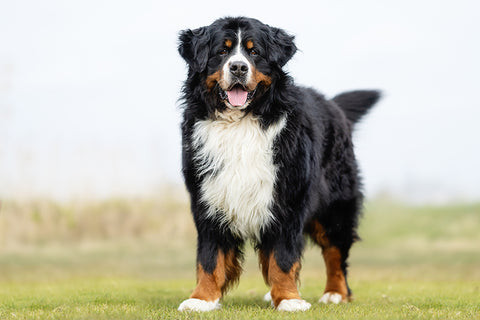 Bernese Mountain Dog
Bernese Mountain Dog
Bernese Mountain Dogs are gentle giants, renowned for their affectionate nature, loyal spirit, and intelligence. Despite their imposing size, they are remarkably gentle and wonderful family dogs. They possess a calm and steady temperament, making them excellent companions for children. While they are large, their moderate activity needs make them adaptable to family life, as long as they receive regular exercise.
Characteristics:
- Personality: Affectionate, gentle, playful, and loyal.
- Energy Level: Moderate to high; they need daily exercise but are not excessively demanding.
- Good with Children: Yes, they are known to be very good with children, exhibiting patience and gentleness.
- Good with Other Dogs: Generally yes, but early socialization is beneficial to ensure they interact well with other dogs, especially smaller ones. Supervision is always recommended during initial introductions.
- Shedding: Regular shedding, especially seasonally.
- Grooming: Weekly brushing is necessary to manage their thick coat and shedding.
- Poodle (Standard, Miniature, and Toy)
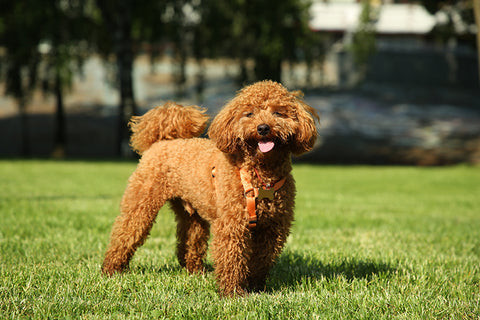 Poodle
Poodle
Poodles, available in standard, miniature, and toy sizes, are intelligent, energetic, and eager to please, making them highly trainable and adaptable family pets. They possess a playful and almost childlike silliness that fits perfectly into family-filled environments. Poodles are also celebrated as one of the best dog breeds for allergy sufferers due to their minimal shedding coats. Their intelligence and trainability make them excellent choices for families who enjoy training and engaging with their dogs.
Characteristics:
- Personality: Trainable, proud, very smart, and playful.
- Energy Level: High, especially Standard Poodles; they require significant daily exercise and mental stimulation. Miniature and Toy Poodles have moderate energy levels.
- Good with Children: Yes, Poodles are generally good with children, especially when raised with them.
- Good with Other Dogs: With supervision; early socialization is crucial to ensure they are comfortable around other dogs.
- Shedding: Minimal shedding, making them a good choice for allergy sufferers.
- Grooming: Daily brushing is essential to prevent matting, and regular professional clipping is required to maintain their coat.
- Beagle
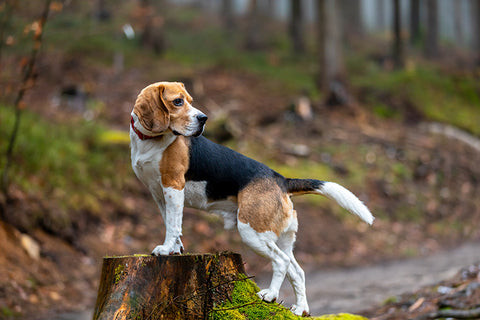 beagle
beagle
Beagles possess an irresistible charm that few can resist. As solid family companions, Beagles are adaptable and can switch seamlessly between playful antics and cuddly moments. Their gentle and even-tempered nature makes them excellent playmates for children. Beagles are curious and love to explore, which can be both entertaining and require careful supervision in a family setting.
Characteristics:
- Personality: Sweet, gentle, upbeat, and curious.
- Energy Level: Moderate; they need daily walks and playtime.
- Good with Children: Yes, Beagles are known to be good with children, enjoying their playful nature.
- Good with Other Dogs: With early socialization; Beagles are pack animals and generally get along well with other dogs, especially if socialized from a young age.
- Shedding: Moderate shedding year-round.
- Grooming: Weekly brushing is sufficient to manage shedding.
- Golden Retriever
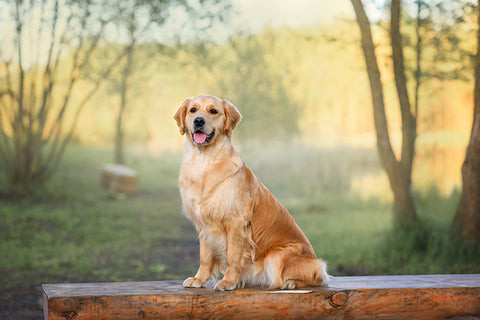 golden retriever
golden retriever
It’s challenging to find a dog breed more fun-loving and devoted than a Golden Retriever. Goldens are perpetually cheerful and thrive on being involved in family activities, enthusiastically participating in whatever games or adventures children dream up. This breed is an exceptional choice for active families seeking a tireless playmate who is always ready for fun and games. Their gentle and patient nature makes them ideal companions for children, and their eagerness to please makes them relatively easy to train.
Characteristics:
- Personality: Affectionate, trusting, devoted, and playful.
- Energy: Very active; Golden Retrievers require significant daily exercise to burn off their energy.
- Good with Kids: Excellent! Golden Retrievers are renowned for their exceptional patience and love for children.
- Good with Other Dogs: Yes, excellent with other dogs, especially when supervised during initial introductions.
- Shedding: Constant moderate to heavy shedding.
- Grooming: Daily brushing is essential to manage their shedding, along with frequent vacuuming around the house.
- Bichon Frise
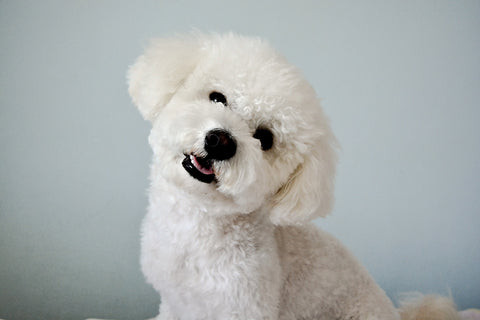 Bichon Frise
Bichon Frise
The Bichon Frise, often described as a “cotton ball with legs,” brings joy and cheerfulness into any home. Their irresistibly fluffy white coat and charming personality have propelled them to popularity as family dogs. Bichons are playful, intelligent, and love performing tricks, making them a delightful source of entertainment for children. Their relatively small size and adaptable nature make them suitable for various living situations, including apartments. Furthermore, their minimal shedding coat makes them a great option for families with allergies.
Characteristics:
- Personality: Playful, cheerful, perky, and intelligent.
- Energy: Moderate; Bichons need daily walks and playtime but are not overly demanding.
- Good with Kids: Excellent! Bichons are known for their gentle and patient nature with children.
- Good with Other Dogs: Yes, they are generally great with other dogs, especially when properly supervised and socialized.
- Shedding: Minimal shedding, considered hypoallergenic.
- Grooming: Daily brushing and regular professional haircuts are essential to maintain their distinctive coat and prevent matting.
- Collie
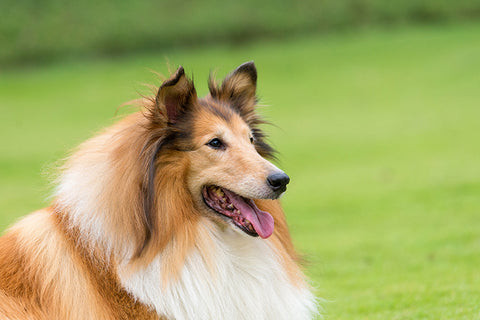 Collie
Collie
Originating from herding lineages, Collies develop intense bonds with “their flock,” which, in a family setting, becomes your household. They become gentle yet vigilant guardians, adept at being active outdoors while remaining composed and calm indoors. Collies are intelligent and responsive, thriving on mental and physical stimulation. They require consistent interaction and activities to meet their needs and prevent boredom. Their loyalty and protective instincts make them devoted family dogs.
Characteristics:
- Personality: Loyal, responsive, protective, and intelligent.
- Energy: Very high; Collies need significant daily exercise and mental stimulation.
- Good with Kids: Yes, but with supervision; their herding instincts might lead them to try to “herd” children, which requires guidance and supervision.
- Good with Other Dogs: Yes, but early socialization is required to ensure they interact well with other dogs.
- Shedding: Twice yearly heavy shedding during shedding seasons.
- Grooming: Daily brushing is necessary during shedding months to manage their thick coat and prevent matting.
- Newfoundland
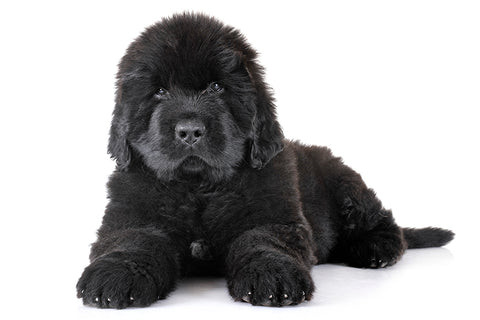 Newfoundland
Newfoundland
Newfoundlands, despite their massive size, are remarkably mild-mannered and gentle. Their tremendous size belies their sweet and patient temperament. They move with surprising grace indoors and patiently tolerate the sometimes chaotic antics of children. Newfoundlands are known for their gentle nature and protectiveness, often referred to as “nanny dogs” due to their inherent care for children. While their size can be intimidating, their calm and loving disposition makes them wonderful family companions.
Characteristics:
- Personality: Calm, generous, obedient, and gentle.
- Energy Level: Moderate; despite their size, Newfoundlands don’t require excessive exercise. Daily walks are sufficient.
- Good with Children: Excellent! Newfoundlands are renowned for their exceptional patience and gentle nature with children.
- Good with Other Dogs: Yes, with supervision; early socialization is helpful, but they are generally good with other dogs.
- Shedding: Year-round heavy shedding.
- Grooming: Weekly brushing is necessary to manage their thick coat and shedding.
- Border Collie
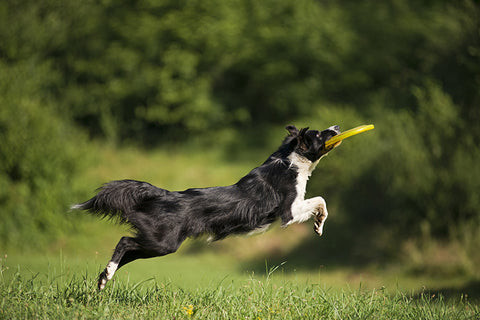 border collie
border collie
Border Collies are recognized as one of the most intelligent dog breeds. Their exceptional intelligence and energy levels require intense daily mental and physical stimulation. They thrive on having a job to do and excel in dog sports and activities. While their intelligence and trainability are assets, their high energy and need for mental engagement mean they are best suited for active families who can provide them with ample exercise and mental challenges. When these needs are met, Border Collies can be incredibly loyal and devoted family members.
Characteristics:
- Personality: Energetic, smart, intense, and highly trainable.
- Energy Level: Very high; Border Collies require significant daily exercise and mental stimulation.
- Good with Children: Excellent with supervision; their herding instincts might lead them to try to herd children, requiring supervision and guidance.
- Good with Other Dogs: Yes, with socialization; early socialization is crucial to ensure they interact well with other dogs.
- Shedding: Seasonal moderate shedding.
- Grooming: Weekly brushing is sufficient to manage their coat.
- Boxer
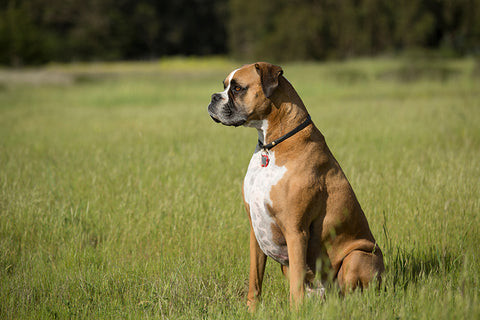 Boxer
Boxer
For families seeking a protective yet silly and fun-loving dog, Boxers are an excellent choice. Their patience, gentleness, and playful swagger make them ideal companions for active households. Boxers are energetic and boisterous, enjoying playtime and family activities. Their protective nature makes them loyal family guardians, while their playful side ensures they are always ready for fun and games with children.
Characteristics:
- Personality: Fun-loving, bright, active, and protective.
- Energy Level: Very high; Boxers require significant daily exercise to burn off their energy.
- Good with Children: Excellent! Boxers are known for their patience and love for children.
- Good with Other Dogs: Requires socialization; early and consistent socialization is crucial to ensure they are comfortable and well-behaved around other dogs.
- Shedding: Moderate year-round shedding.
- Grooming: Weekly brushing is sufficient to manage their short coat.
- Shih Tzu
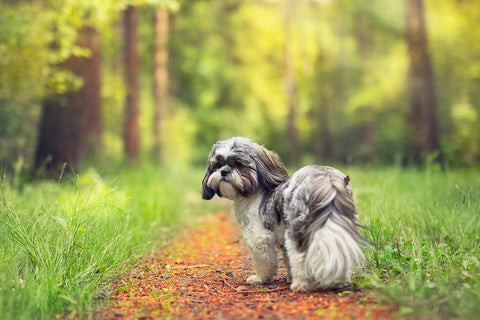 Shih Tzu
Shih Tzu
The Shih Tzu is an easygoing, affectionate, and trusting breed, making them wonderful companions. Their cuddly and adaptable nature suits a variety of activity levels. Shih Tzus are content with moderate exercise and enjoy spending time with their families. Their friendly and gentle disposition makes them well-suited for families with children, and their smaller size makes them adaptable to apartment living.
Characteristics:
- Personality: Friendly and bright, affectionate, and adaptable.
- Energy Level: Moderate; Shih Tzus need daily walks but do not require intense exercise.
- Good with Children: Excellent! Shih Tzus are known to be good with children, enjoying their company.
- Good with Other Dogs: Yes, they generally get along well with other dogs.
- Shedding: Moderate shedding.
- Grooming: Regular brushing is necessary to maintain their long coat and prevent matting.
- Welsh Corgi (Pembroke or Cardigan)
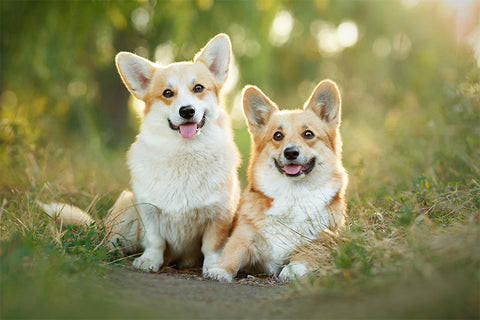 Welsh Corgi
Welsh Corgi
Originally bred to herd cattle, Welsh Corgis retain their spunky boldness and intelligence. They engage in amusing play sessions with respectful children and thrive when included in family activities. Corgis are intelligent and active dogs who enjoy being part of the family. Their herding background means they may try to herd children, which requires training and guidance. However, their playful and affectionate nature makes them wonderful family pets.
Characteristics:
- Personality: Bold, smart, vocal, and playful.
- Energy Level: Moderate; Corgis need daily exercise and mental stimulation.
- Good with Children: Good with supervision; their herding instincts may require supervision and training when interacting with children.
- Good with Other Dogs: Requires socialization; early socialization is important to ensure they get along well with other dogs.
- Shedding: Heavy year-round shedding.
- Grooming: Regular brushing is necessary to manage their shedding coat.
- Irish Setter
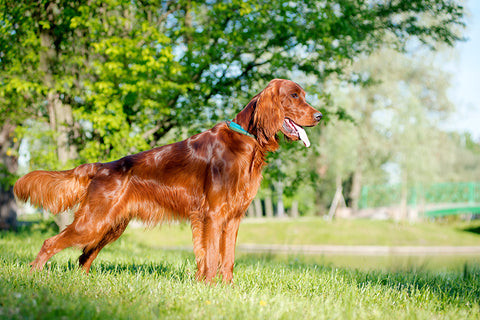 Irish Setter
Irish Setter
The Irish Setter is an active and fun-loving companion, always alert and enthusiastic. Their energetic and playful nature makes them wonderful companions for active families. Irish Setters are known for their exuberance and love for life. They require significant exercise and thrive in homes where they can be active participants in family adventures. Their friendly and outgoing personality makes them wonderful family dogs, particularly for those who can match their energy levels.
Characteristics:
- Personality: Rambunctious, clownish, demonstrative, and energetic.
- Energy Level: High; Irish Setters need significant daily exercise to burn off their energy.
- Good with Children: Good with supervision; while generally good-natured, their high energy levels may require supervision around very young children.
- Good with Other Dogs: Yes, they generally get along well with other dogs.
- Shedding: Significant year-round shedding.
- Grooming: Thrice weekly brushing is needed to manage their coat and shedding.
- Vizsla
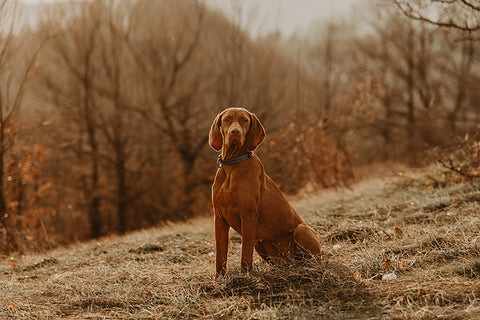 Vizsla
Vizsla
Vizslas possess a striking appearance that sets them apart. Their sleek, rust-colored coat and elegant build are visually captivating. Notably, their lack of an undercoat minimizes shedding concerns, making them an appealing choice for families with active children who may have sensitivities to dog hair. Vizslas are energetic and affectionate, forming strong bonds with their families. They require significant exercise and thrive on being active participants in family life.
Characteristics:
- Personality: Gentle and energetic, affectionate, and loyal.
- Energy Level: High; Vizslas need significant daily exercise and thrive on activity.
- Good with Children: Yes, with supervision; while generally good-natured, their high energy levels may require supervision around very young children.
- Good with Other Dogs: Yes, but under supervision; early socialization is beneficial to ensure they interact well with other dogs.
- Shedding: Low shedding, due to their lack of undercoat.
- Grooming: Weekly brushing is sufficient to maintain their coat.
- Samoyed
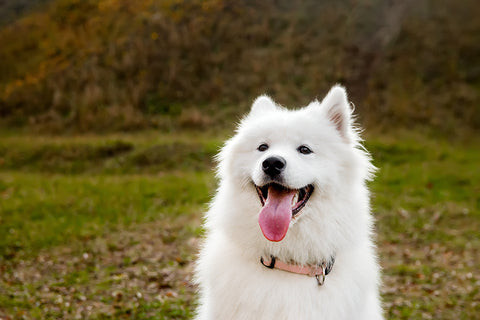 Samoyed
Samoyed
Samoyeds are instantly recognizable by their distinctive “Sammy smile,” which perfectly reflects their amiable and gentle temperament. They adapt effortlessly to family routines and are remarkably loyal companions. Samoyeds are known for their friendly and playful nature, making them wonderful family pets. Their thick, white coat is beautiful but requires significant grooming. They are energetic dogs who need regular exercise but are also content to relax with their families.
Characteristics:
- Personality: Friendly and gentle, playful, and loyal.
- Energy Level: High; Samoyeds need regular daily exercise.
- Good with Children: Yes, but may need supervision; while generally good with children, their size and energy levels may require supervision, especially with very young children.
- Good with Other Dogs: Yes, they generally get along well with other dogs.
- Shedding: High shedding, especially seasonally.
- Grooming: Brushing twice a week is necessary to manage their thick coat and shedding, with more frequent brushing needed during shedding seasons.
The Friendliest Dog Breeds: Spreading the Love
While most well-socialized dogs have the potential to become wonderful companions, some breeds are particularly known for their trusting and outgoing nature, even towards unfamiliar people. These breeds often readily befriend strangers and are generally considered to be exceptionally friendly.
-
Labrador Retriever: It’s no coincidence that Labrador Retrievers consistently top popularity charts. This exceptionally eager-to-please breed lives to love people and other animals. Their patience, gentle nature, and inherent friendliness make them one of the friendliest of all family dog breeds.
-
Golden Retriever: Sharing the Labrador Retriever’s friendly and tolerant temperament, Golden Retrievers make friends easily and are typically always happy to meet new people. Their perpetually cheerful disposition and affectionate nature make them universally loved.
-
Cavalier King Charles Spaniel: Few can resist the charm of a Cavalier King Charles Spaniel. Their mild-mannered and gentle nature makes them wonderful companions for everyone, from toddlers to seniors. Their affectionate and adaptable personalities make them excellent family pets.
-
Irish Setter: Beneath their elegant red coat lies an incredibly outgoing and warm heart. Irish Setters enthusiastically greet new humans with zealous, welcoming “joy jumps” and affectionate nuzzles. However, it’s important to provide them with sufficient exercise to channel their energy positively and prevent boredom-related mischief.
-
Mixed Breed Dogs: The beauty of mixed-breed dogs lies in their diverse backgrounds. Many inherit the friendly temperaments of family-oriented breeds like Labradors or Retrievers, often making them wonderful and adaptable family companions. Adopting a mixed-breed dog can be a rewarding way to bring a loving and unique dog into your family.
Low-Maintenance Family Dog Breeds: Simpler Pet Ownership
For families seeking a dog breed that is relatively low-maintenance, certain breeds stand out. Choosing small to medium-sized breeds can often simplify pet ownership.
Breeds like Labrador Retrievers, while energetic, can be relatively low-maintenance in terms of grooming and have eager-to-please personalities that make training easier. They generally require minimal specialized grooming and are adaptable to family life.
Most low-maintenance family dogs still need regular short walks and playtime to remain happy and healthy. However, they are often content with lounging around the house and are less demanding in terms of extensive exercise or specialized care.
Some of the best low-maintenance dog breeds for families also have coats that require less intensive grooming, which can be a significant benefit for busy, on-the-go families.
Essential Tips for Caring for Your Family Dog
Bringing a dog into your family is a commitment that requires ongoing care and attention. Here are some essential tips to ensure your family dog thrives:
-
Create a Clean and Safe Home Environment: Dog-proof your home by scanning for potential hazards at dog-nose level. Secure loose wires, store cleaning supplies and medications out of reach, and tidy away small objects that could be choking hazards. Repair any faulty fencing in your yard to ensure a secure outdoor space. Supervise play interactions, especially between children and dogs, to ensure gentle and safe play.
-
Stick to a Reliable Routine: Dogs thrive on routine. Establish a consistent schedule for feeding, walks, playtime, and bedtime. Consistency in daily routines aids in training and helps cement good behaviors as dogs learn what to expect each day. Using high-quality dog food and maintaining consistency in their diet, like James Wellbeloved™ Dog Food, can contribute to their overall health and well-being.
-
Make Veterinary Care a Priority: Proactive veterinary care is crucial for your dog’s long-term health. Schedule regular vet checkups for preventative care, vaccinations, and parasite control. Keep vaccinations up-to-date and administer flea and worm treatments as recommended by your veterinarian. Follow any specialized diet or exercise guidance provided by your vet based on your dog’s breed, age, and health needs.
-
Engage the Kids in Dog Care (Responsibly): Involve children in caring for the family dog in age-appropriate ways. Teach them how to gently pet the dog, offer training treats as rewards, and participate in supervised play. Children can also help with tasks like filling water bowls, under adult supervision. Always emphasize gentle and respectful interactions between children and dogs and never leave them unsupervised.
-
Stick to Proper Diet and Exercise: Ensure your dog receives adequate mental and physical stimulation. Follow veterinarian feeding guidelines to provide the right amount of nutrition for their age, breed, and activity level. Choose high-quality dog food and avoid feeding unhealthy table scraps. Provide daily exercise appropriate for your dog’s breed and energy level to maintain their physical and mental well-being. Be aware of dog home safety tips to prevent accidents and ensure a safe environment for your canine companion.
Conclusion: A Lifetime of Joy with the Right Family Dog Breed
Choosing the right family dog breed is a decision that requires careful consideration of breed traits and individual temperaments, ensuring a good match with your family’s lifestyle and capabilities. While the process may require effort and research, the rewards of finding the perfect furry friend are immeasurable. The right dog will enrich your family life, bringing years of joyful memories, unwavering companionship, and unconditional love.
Consider joining a Puppy Club for resources and support as you welcome a puppy into your family. Many offer expert nutritional advice and tips to help you navigate your puppy’s first year, setting the stage for a long and happy relationship.

